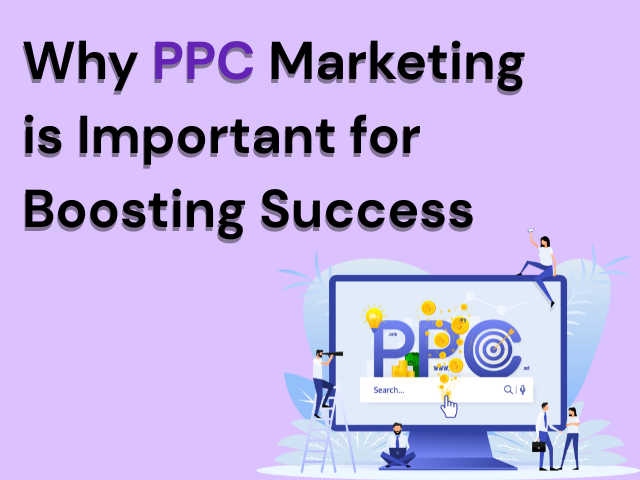Why PPC Marketing is Important for Boosting Success?
Why PPC Marketing is Important for Boosting Success Why PPC Marketing is Important for Boosting Success In today’s digital age, where competition is fierce and attention spans are fleeting, businesses are constantly on the lookout for strategies that can elevate their online presence and drive tangible results. One such strategy that has gained immense prominence is Pay-Per-Click (PPC) marketing. In this comprehensive guide, we’ll delve deep into the world of PPC marketing, uncovering why it’s crucial for boosting success in the digital realm. From its fundamental concepts to its advanced strategies, we’ll explore the multifaceted advantages that make PPC marketing an indispensable tool for modern businesses. Chapter 1: Understanding PPC Marketing PPC marketing, at its core, involves advertisers paying a fee each time their ads are clicked by users. It’s a model that facilitates instant visibility in search engine results pages (SERPs) and other online platforms. By bidding on keywords relevant to their business, advertisers secure ad placements and only pay when their ads generate clicks. This targeted approach ensures that businesses are reaching the right audience at the right time. 1.1 The Components of a PPC Campaign – Keywords: Selecting relevant keywords is the foundation of a successful PPC campaign. – Ad Copy: Crafting compelling ad copy that resonates with users is essential for click-through rates. – Landing Pages: Optimized landing pages ensure a seamless transition from ad to conversion. – Bid Strategy: Deciding on bidding strategies to secure optimal ad placements within budget constraints. Chapter 2: The Advantages of PPC Marketing Advantage 1: Instant Visibility and Results PPC marketing offers businesses immediate visibility on search engines and platforms, bypassing the time-consuming process of organic search engine optimisation (SEO). Advertisers can appear at the top of search results, ensuring that their products and services are showcased to users actively seeking them. Advantage 2: Highly Targeted Advertising PPC marketing allows advertisers to precisely target their audience based on factors such as demographics, location, interests, and device. This ensures that ad spend is directed towards users who are most likely to convert, maximising ROI. Advantage 3: Budget Control and Flexibility With PPC marketing, advertisers have complete control over their budgets. They can set daily, weekly, or monthly limits, preventing overspending. Moreover, campaigns can be adjusted in real-time based on performance, ensuring efficient resource allocation. Advantage 4: Measurable and Actionable Insights PPC platforms provide detailed analytics that offer insights into campaign performance. Metrics such as click-through rates, conversion rates, and cost per acquisition enable advertisers to measure ROI and refine their strategies accordingly. Advantage 5: Enhanced Brand Visibility Consistent presence in SERPs through PPC ads increases brand visibility and recognition. Even if users don’t click on the ad, they still see the brand name, reinforcing its authority and credibility. Advantage 6: Remarketing Opportunities PPC marketing enables businesses to re-engage users who have previously interacted with their brand. Remarketing campaigns target users with tailored ads, reminding them of products they’ve shown interest in, and encouraging them to convert. Advantage 7: Competitive Edge In competitive industries, PPC marketing provides a competitive edge by allowing smaller businesses to compete with larger players. Strategic bidding and ad optimisation can yield prominent placements, driving traffic and conversions. Chapter 3: Strategies for PPC Success Strategy 1: Keyword Research and Selection Thorough keyword research is the foundation of a successful PPC campaign. Using keyword research tools, businesses can identify high-performing keywords that align with their offerings and user intent. Strategy 2: Ad Copy Optimisation Compelling ad copy is essential to capture user attention and drive clicks. Crafting concise, relevant, and persuasive ad copy that highlights unique selling points can significantly boost click-through rates. Strategy 3: Landing Page Optimization A well-optimised landing page ensures a seamless transition from ad click to conversion. Pages should be relevant, load quickly, and provide a clear call to action, maximising the chances of conversion. Strategy 4: Bid Management and Budget Allocation Effective bid management ensures optimal ad placements within budget constraints. Advertisers can adjust bids based on keyword performance, time of day, and device, ensuring efficient use of resources. Strategy 5: A/B Testing A/B testing involves creating multiple ad variations to determine which performs best. Testing elements such as headlines, ad copy, and visuals can uncover insights that lead to improved click-through and conversion rates. Strategy 6: Geographic and Device Targeting Segmenting campaigns based on location and device preferences allows advertisers to tailor their messages to specific audiences. This ensures that ads are relevant and resonate with users’ preferences. Chapter 4: PPC Platforms and Channels 4.1 Google Ads Google Ads, the most popular PPC platform, offers a range of ad formats, including search ads, display ads, shopping ads, and video ads. Advertisers can leverage Google’s extensive reach to connect with users across the globe. 4.2 Social Media Advertising Social media platforms like Facebook, Instagram, Twitter, and LinkedIn provide powerful PPC opportunities. These platforms offer granular targeting options, enabling advertisers to reach specific demographics and interests. 4.3 Display Advertising Display advertising involves placing banner ads on websites, targeting users based on their browsing behavior. It’s a valuable strategy for creating brand awareness and driving user engagement. Chapter 5: Case Studies and Success Stories Case Study 1: E-commerce Success with Google Shopping Ads Explore how an e-commerce store increased sales and revenue by implementing Google Shopping Ads. Learn about strategies such as product feed optimization and bid management that contributed to their success. Case Study 2: Remarketing Excellence on Facebook Discover how a company effectively used Facebook’s remarketing capabilities to re-engage previous website visitors and convert them into paying customers. Understand the key elements that led to their remarkable results. Conclusion In the ever-evolving digital landscape, PPC marketing stands as a powerhouse strategy that offers unparalleled advantages for businesses aiming to boost success. With its immediate visibility, highly targeted reach, and measurable insights, PPC marketing empowers businesses to connect with their audience, drive conversions, and achieve remarkable results. By mastering the art of PPC marketing and implementing effective strategies, businesses can harness the potential of …
Why PPC Marketing is Important for Boosting Success? Read More »




